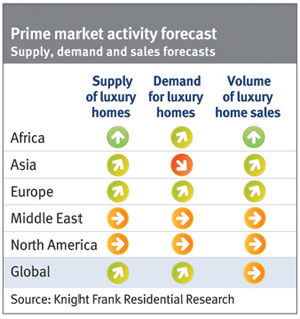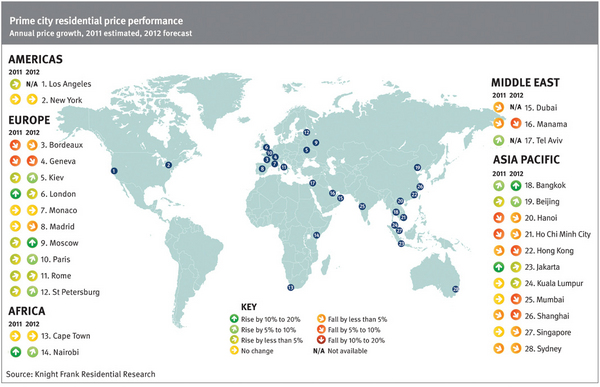The WPJ
THE WORLD PROPERTY JOURNALReal Estate Facts Not Fiction
Residential Real Estate News

Knight Frank Predicts Even Split of Global Prime Residential Market Growth in 2012
Residential News » Asia Pacific Residential News Edition | By Michael Gerrity | December 30, 2011 9:00 AM ET
 According to London-based real estate firm Knight Frank, prime global city markets in 2012 are likely to outperform their mainstream national counterparts, but don't expect all prime residential markets to deliver positive growth.
According to London-based real estate firm Knight Frank, prime global city markets in 2012 are likely to outperform their mainstream national counterparts, but don't expect all prime residential markets to deliver positive growth.Knight Frank tells the World Property Channel that before 2007 the global housing market was a much simpler subject to analyze. Prices and demand rose year-on-year pretty much everywhere and at almost every level of the market. Then came the credit crunch, and things became more complex.
Following the introduction of stimulus measures - the global response to the crisis in late-2008 - a geographical separation opened between the markets in the weakened West and those in the newly resurgent Asia-Pacific, where lower interest rates began to stoke a second boom in pricing.
The stimulus measures also opened a divide between mainstream markets and prime, or luxury, markets globally. Affluent purchasers took advantage of ultra-low mortgage rates, and central bank asset purchases created a wave of investment funds which drove pricing in 'safe-haven' assets higher.
As wealth portfolios recovered after 2009, demand for prime property rose across the world, leading to a sharp upturn in cross border property investment flows.
Asian demand for new-build development purchases in central London is an obvious manifestation of this latter trend. The same phenomenon has been witnessed in Asia, with more than 30% of Singapore's prime market purchases going to non-domestic buyers, and in North America, where rising demand from wealthy Brazilian investors is helping to drive prices in New York and Miami.
See related news story on WORLD PROPERTY CHANNEL:
Liam Bailey, head of residential research at Knight Frank says, "Growing global uncertainty and government intervention in the property market, especially in Asia, will weigh on prices in some areas. But some cities, such as Moscow and Bangkok, will shrug off these concerns to register growth of between 10 and 20% in 2012. Paris, Kiev and St Petersburg are all expected to rise by 5 to 10%, with London slotting in next with a rise of 5%."
Bailey further states, "However, Shanghai, Mumbai, Manama, Hong Kong and Geneva are tipped to fall by between 10 and 20%."
Worsening sovereign debt conditions in Europe, weak banking sector performance and a sluggish global economy are weighing heavily on global housing markets. Price growth in the world's mainstream housing markets averaged 0.9% in the year to September, down from 3.5% a year earlier.
With national markets flagging, conditions in the world's luxury city markets are holding up a little better. In 2012, Knight Frank expects prices to either rise or remain flat in around half the cities they monitor.
Following the 2008 credit crunch, the relative outperformance of prime residential property has meant that it continues to be viewed favorably by wealthy investors. This has become more evident as the list of alternative investment options open to investors has shrunk.
While the prime markets may be outperforming their mainstream peers, they are in no way immune from weakening confidence and deteriorating market conditions. Cities across Asia-Pacific are at the sharp end of this process, with weaker sales volumes in many cities starting to feed through into price growth.
Twelve months ago average prices for Asia's luxury homes were rising in value by 16.3% annually. At the end of September this year, the comparable figure was closer to 2%.
Of the cities covered in their forecast, 32% are expected to see luxury house prices fall in 2011, 25% are tipped to remain unchanged, and the remaining 43% are expecting prices to end the year higher than they started. Jakarta and Nairobi are forecast to be the strongest performers in 2011, with prices rising by up to 20% over the year.
Positive price movements this year can largely be attributed to rising cross-border demand from wealthy individual investors (especially in London and Paris), a lack of new supply (Moscow) and strong growth in domestic wealth (Beijing).
For those cities where prices are falling this year, weaker economic activity is a contributory factor in the majority of cases (Geneva, Hong Kong and Sydney), but weakening demand in the Middle East (Manama) and monetary tightening (Mumbai) also feature.
What's Coming in 2012?
For 2012, Knight Frank forecasts a relatively even split, with price falls expected in 44% of cities, no change in 12% and rising prices in 44%.
Perhaps the most interesting trend is the lack of homogeneity across the continents.
In Europe, Geneva and Madrid will see prices decline in 2012, but expect Moscow and Paris to be among the strongest performing markets.
Similar disparities can be observed in Asia. Hong Kong is forecast to see luxury prices decline by between 5% and 10%, while prices in Beijing are expected to rise by a comparable amount.
Seven Asian cities are expected to see negative price growth in 2012. In most cases these price falls have been partly driven by government regulation, which was brought in after 2008 in an attempt to cool housing markets before they experienced US and European style crashes.
These steps were bolstered in recent years, as concerns over speculative investment rose and rising household wealth created price pressures. The measures have proved hard-hitting and have included curbing multiple home ownership, halting bank loans for uncompleted projects and increasing interest rates.
Away from government intervention in Asia, the main reason for price falls in 2012 is the growing global economic uncertainty emanating from the Eurozone and extending to other parts of the world.
Given the seriousness of the economic threat facing the world economy, some might find it surprising that Knight Frank forecasts positive growth in 44% of their key global city markets.
Limited supply in several markets is the pivotal factor, and it is expected to push prices higher in London, Paris, Moscow, Nairobi and Kuala Lumpur.
Knight Frank's head of International Residential Research Kate Everett-Allen says, "Price growth in 2012 will continue to be underpinned by the flight of capital from troubled world regions, a factor which has certainly aided demand in locations like London, Paris, Singapore and Geneva".
Allen continues, "Equally important is the desire of wealthy investors to target property and other real assets over financial products, certainly for as long as the current financial turmoil continues."

Sign Up Free | The WPJ Weekly Newsletter
Relevant real estate news.
Actionable market intelligence.
Right to your inbox every week.
Real Estate Listings Showcase
Related News Stories
Residential Real Estate Headlines
- More Americans Opting for Renting Over Homeownership in 2024
- BLOCKTITLE Global Property Tokenization Platform Announced
- Small Investors Quietly Reshaping the U.S. Housing Market in Late 2024
- Greater Miami Overall Residential Sales Dip 9 Percent in November
- U.S. Home Sales Enjoy Largest Annual Increase in 3 Years Post Presidential Election
- U.S. Housing Industry Reacts to the Federal Reserve's Late 2024 Rate Cut
- U.S. Home Builders Express Optimism for 2025
- Older Americans More Likely to Buy Disaster-Prone Homes
- NAR's 10 Top U.S. Housing Markets for 2025 Revealed
- U.S. Mortgage Delinquencies Continue to Rise in September
- U.S. Mortgage Rates Tick Down in Early December
- Post Trump Election, U.S. Homebuyer Sentiment Hits 3-Year High in November
- Global Listings Aims to Become the Future 'Amazon of Real Estate' Shopping Platform
- Greater Las Vegas Home Sales Jump 15 Percent in November
- Ultra Luxury Home Sales Globally Experience Slowdown in Q3
- World Property Exchange Announces Development Plan
- Hong Kong Housing Market to Reach Equilibrium in Late 2025
- Construction Job Openings in U.S. Down 40 Percent Annually in October
- U.S. Mortgage Applications Increase in Late October
- World Property Markets, World Property Media to Commence Industry Joint-Venture Funding Rounds in 2025
- New Home Sales Hit 2 Year Low in America
- U.S. Pending Home Sales Increase for Third Consecutive Month in October
- Pandemic-led Residential Rent Boom is Now Fizzling in the U.S.
- Emerging Global Real Estate Streamer WPC TV Expands Video Programming Lineup
- 1 in 5 Renters in America Entire Paycheck Used to Pay Monthly Rent in 2024
- U.S. Home Sales Jump 3.4 Percent in October
- Home Buyers Negotiation Power Grows Amid Cooling U.S. Market
- Canadian Home Sales Surge in October, Reaching a Two-Year High
- Greater Orlando Area Home Sales Continue to Slide in October
- U.S. Mortgage Credit Availability Increased in October
- U.S. Mortgage Rates Remain Stubbornly High Post Election, Rate Cuts
- Construction Input Prices Continue to Rise in October
- BETTER MLS: A New Agent and Broker Owned National Listings Platform Announced
- Home Prices Rise in 87 Percent of U.S. Metros in Q3
- Caribbean Islands Enjoying a New Era of Luxury Property Developments
- The World's First 'Global Listings Service' Announced
- Agent Commission Rates Continue to Slip Post NAR Settlement
- Market Share of First Time Home Buyers Hit Historic Low in U.S.
- Greater Palm Beach Area Residential Sales Drop 20 Percent Annually in September
- Mortgage Applications in U.S. Dip in Late October
Reader Poll
Marketplace Links
This website uses cookies to improve user experience. By using our website you consent in accordance with our Cookie Policy. Read More





